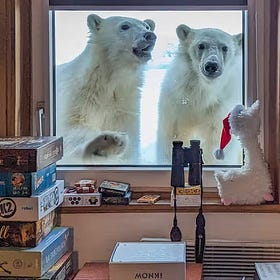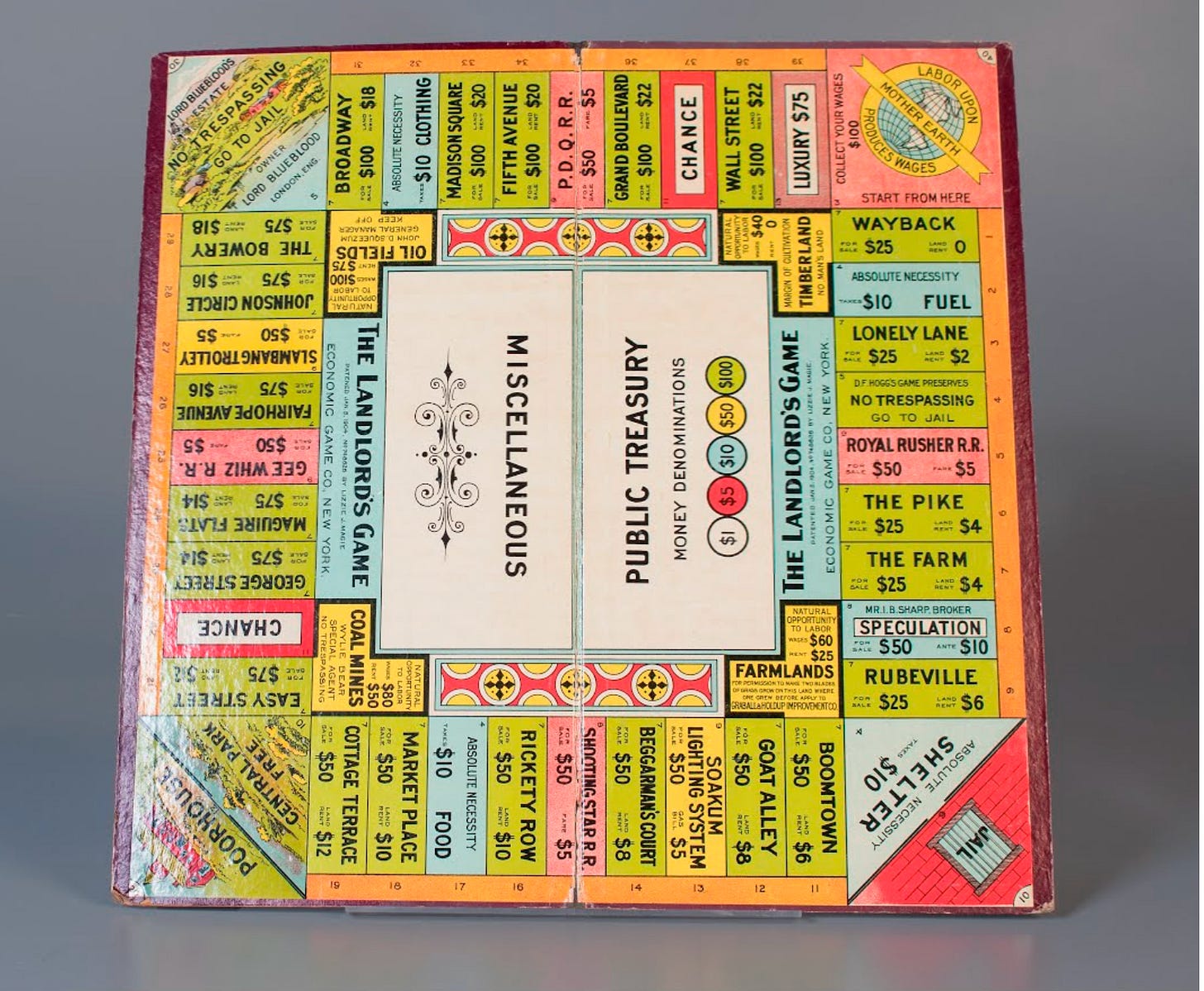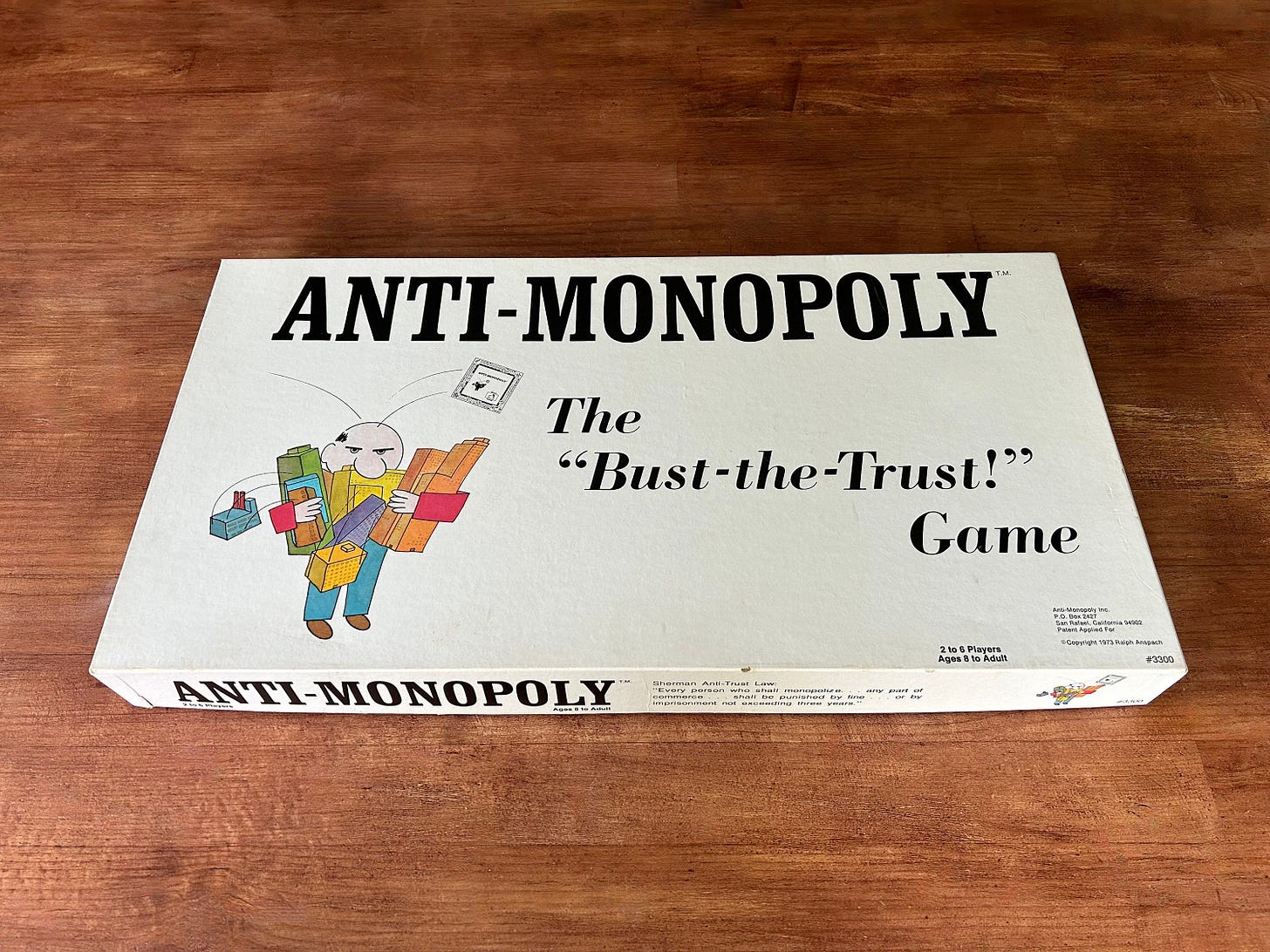The Art of Losing and Playing Monopoly with Luigi Mangione
with a guest appearance by my photogenic heart
Hello to all, and particularly to my new subscribers! There are a number of you since yesterday, I think thanks to this piece:
If you’re interested in reading more about my experience on board the ‘plague ship,’ I wrote and published a multi-part series in live time, which you can read here:
Arctic Circle Diaries
Greetings from 85 degree LA, where I’m packing winter clothes for a writing residency in the Arctic Circle.
Arctic Diaries: Sick at Sea
According to the doctor’s estimate, over 50% of the ship now has COVID. Myself - probably - included. There was no storm, though!
Arctic Diaries: Plague Ship Takes Pack Ice
Hello from land! The trip is now over - I’m a little behind due to covid brain fog and general lack of writing time. My covid ended up being rougher and more prolonged than I’d hoped, but I’m finally through the thick of it. So, now, catching up on trip reports and flashing back to last Sunday, when our expedition leader announced that we would be heading north for the pack ice. The combination of cheers and coughs in the room was a thing to behold.
In other news, brain fog.
I keep losing things. Chargers. Crochet hooks. Things I was holding just a minute ago. Words.
Yesterday, I had an echocardiogram. I lay on my side as the sonographer pressed a gel-covered wand into my chest. “Wow,” she said, looking at the screen, the pulsing orbs of my heart. She clicked to freeze the image, zoomed in.
“Good or bad wow?” I asked.
“See these?” she said. “These are your pulmonary veins. You almost never get to see both the left and the right one in the same image.”
It looked like…I’ll be honest, it looked like not much to me. Some circles, two openings.
“Why not?” I asked.
“Various reasons. The shape of the heart, the body. I have to take a capture of this to share with the doctor and the others. They’re going to nerd out over it, it’s so cool.”
“Does it mean anything about my heart health?”
“No. It’s just you have a very photogenic heart.”
Two minutes later, still lying there, still mid-procedure, I tried and failed to remember what two parts of my heart she’d said were in the image. I had to ask her to repeat them.
So, after weeks of insisting that I don’t have brain fog – that oh-so-common long covid symptom – I have to concede that I absolutely do. It’s unnerving. I pride myself on my memory. It’s a strength. The kind of thing I have to sometimes carefully downplay, because it turns out people think it’s weird if you consistently remember things they don’t have any memory of saying.
Last night, I stumbled around my house trying to figure out where the tiny USB charger attachment for my heart rate sensor had gone, why it wasn’t where I swear I left it the last time I used it, and why even if I couldn’t find that one, why I couldn’t at least locate the replacement charger I ordered last week when I was in this exact situation. Running through my head, as I groped around a drawer: Elizabeth Bishop, “The art of losing isn’t hard to master/ So many things seem filled with the intent / to be lost that their loss is no disaster.”
I can remember poetry but not where I put the scissors I was holding just two minutes ago I swear. Knowing my long-term memory is still there makes me feel a little better.
But in my pre-frontal cortex (or is it the hippocampus that stores short term memory?), where once was super glue now lives a used lint roller.
The analytical part of my brain still works, though. Mostly. Depending on what I’m trying to make it do.
Interpret the deliberately obfuscatory jargon of my latest mail from Blue Shield of California? No. That’s beyond me. But that was the case before COVID, too.
I never feel as dumb as I do when trying to understand the text of health insurance documents. And I have a degree from Harvard in interpreting English language texts.
So, I’ve abandoned the attempt to decode my insurance restrictions in favor of a different, health insurance-related close reading: decoding Luigi Mangione’s game of Monopoly.
Monopoly: As a game, I’ve never loved it. It’s too long, and I always found it boring. I’m not sufficiently motivated by the goal of real estate acquisition. I am, however, fascinated by the game of Monopoly that Luigi Mangione is playing – and is inviting the public to play as well.
First and foremost: Mangione left a backpack full of Monopoly money at the scene of the crime, in the center of the city that most represents American economic ambition. In this, it’s easy to read a reference to UHC’s monopoly and a reminder that UHC is playing the game as it was designed to be played – to benefit the rich at the expense of the poor.
Five days after the shooting, Mangione is found at a McDonald’s in Altoona, Pennsylvania. Taking off his mask to eat a hash brown, laptop on the table in front of him.
Mangione knows how to evade detection – he navigated through Manhattan after the shooting without issue. If he wanted to flee, he could and would have gotten much further than Pennsylvania. Also: this is a health-conscious guy who read and liked Michael Pollan. I’d venture a guess that McDonald’s isn’t part of his regular diet.
McDonald’s – golden arch exemplar of American capitalism, padding its pockets while clogging the arteries of people worldwide – ran an annual game of Monopoly for decades, though it was halted in the US after a major fraud scandal.1
The game of Monopoly has four railroads; one of them is the Pennsylvania Railroad. At its peak, the Pennsylvania Railroad was the largest transportation enterprise and the largest corporation in the world. A monopoly, if you will. Altoona was the base for its rail operations across the Alleghenies.
But wait, there’s more: Altoona, Pennsylvania, was also the home of a man named John Heap, who created a game he called “monopoly” using the city landmarks of Altoona on the game map. Charles Darrow later learned a version of the game from friends and made it his own, changing the locations to Atlantic City, NJ and claiming sole copyright. Heap’s Altoona version was later used in court to disprove Darrow’s sole copyright claims.
Now, I hope you’ll indulge me in a Monopoly-related digression that has little to do with Mangione, but is, IMO, the most interesting part of Monopoly’s origin story.
The oft-told story of Monopoly’s origins is that during the Great Depression, an unemployed Charles Darrow dreamed it all up himself and then sold the game to Parker Brothers and made a fortune. What Darrow failed to mention to Parker Brothers? That he wasn’t the game’s inventor. John Heap of Altoona wasn’t either.
That honor belongs to Elizabeth Magie, a progressive feminist with an anti-monopoly message.2
Elizabeth Magie was a follower of Henry George, a reformer famous for the book Progress and Poverty, in which he proposed a single tax on land values as a means of creating a more just society. The tax would be based on the usefulness, size, and location of the land. After funding the government, the leftover money from the land tax would be redistributed to the people.
Magie designed a game that she hoped would illustrate George’s philosophy. She called it The Landlord’s Game, and applied for a patent in 1903. (A time when only 1% of patents were held by women.)
Magie created two sets of rules for the game: an anti-monopolist rule set whereby everyone benefited from the creation of wealth, and a monopolist rule set, where the goal was to build monopolies and amass wealth at the expense of others. The intention: illustrate the inequality of the latter and the superiority of the first set of rules, through which everyone could win and thrive.
But that set of rules proved less popular when it came to game-play. This was America, after all. Land of individual ambition. Land of winners. You can’t win if nobody loses.
And Charles Darrow was the winner. He made a fortune off of Monopoly royalties. When Parker Brothers learned about Elizabeth Magie and The Landlord Game, they offered her a measly $500 total for the rights to her patent. No royalties, obvi.
Now, flash forward to 1974, when an economics professor named Ralph Anspach created a game he called Anti-Monopoly.
Anti-Monopoly was hugely successful, which was a problem for Monopoly’s monopoly…so Parker Brothers sued Anti-Monopoly for trademark infringement. This led to a nine-year legal battle that landed in the Supreme Court, during which several folk-art versions of the game were presented as evidence.
One such game, predating Darrow’s by over a decade, was designed by John Heap of Altoona, PA. The street names were from Altoona, but many other details, including the playing pieces, were identical to Darrow’s game.
Anspach ultimately won the lawsuit, but not the game, because: have you heard of Anti-Monopoly, the game?3
Thank you for indulging my digression.
Now let’s return to December 9, 2024 and the decidedly more violent anti-monopolist of the moment, Luigi Mangione, removing his mask to eat a hash brown in Altoona’s McDonald’s, five days after shooting Brian Thompson.
Doesn’t seem like a stretch to me to presume that Mangione chose to be found in Altoona, and specifically at that McDonald’s.
“Go To Jail” is a Monopoly card, and when a player pulls it, or lands on the jail square, it ends their turn. Mangione has gone to jail.
Now, he is more than implying, it’s the next player’s turn.
Now is not the time to twist ourselves in knots about whether it’s good or bad that people are cheering for Mangione’s actions or get stuck in purely intellectual discussions about how we reached such a state of social decay. (Though it’s worth reading Jia Tolentino’s thoughtful piece about it).
That’s a discussion worth having – but it must be followed by action.
What, though? Not murder; to be clear, I’m anti-murder.
Here’s where I get stuck. A couple of months ago, an obvious answer would have been: VOTE. For the love of democracy and the health of the country and its citizens, or any semblance thereof, vote. But that ship has sailed.
We are a single terrifying month away from Donald Trump’s return to office. There’s talk of gutting all sorts of consumer-protection measures and agencies. California has declared a state of emergency over H5N1. RFK’s lawyer has petitioned the FDA to revoke approval for the polio vaccine. Polio! Is he secretly working for Big Iron Lung?
Things are bad and going to get worse. And we’re online sharing our healthcare horror stories online and arguing about pro-corporate bias in mainstream media coverage when we need to be organizing. We need collective action.
There are no guns in Monopoly. No violence. What there is: money.
Health insurance companies determine who deserves to be treated and who doesn’t - who lives and who dies - and we pay them for it. We keep paying because we’re playing by the rules even though the rules are fucked. Because we don’t want to be fucked any more than we already will be if faced with a medical emergency.
I had a pie-in-the-sky thought the other day, which was, What if everyone collectively refused to pay their insurance premiums next month? But many if not most people have their health insurance premiums automatically deducted from their paycheck, and this kind of action would only work if it had the kind of buy-in that’s impossible to achieve.
Then what? I don’t know. I just know that money speaks. Louder than words, and I say that as a writer who has devoted her life to a faith in the power of words. But looking at my latest mail from Blue Shield, I understand only the bolded numbers — the amount they expect from me and the amount they are unwilling to pay. The words purporting to explain why are gibberish.
So maybe, if not money, then language. We can, and must, demand transparency. Full disclosure of claims approval processes. Accountability. No more hiding behind obfuscatory jargon and the impenetrable maze of 1-800 customer support numbers.
It’s imperative that we figure out how to harness and channel the righteous collective outrage against the healthcare industry into action before it’s subsumed by the next headline-grabbing emergency.
It’s our turn. And this is a game we can’t afford to lose.
Finally, to end on a more upbeat note, some positive things —-
I made a rare recent outing to moderate a talk with talented photographer Siri Kaur (who I met on my Arctic Circle residency and is part of the lingering covid symptoms club) about her latest gallery show, “In the Company of Wolves.” You can check out her work here.
I’m currently reading, and loving, the novel Lost on Me by Veronica Raimo. It’s a dry and deeply funny first-person account of a writer’s coming-of-age in a dysfunctional family on the outskirts of Rome.
Watching: No Good Deed on Netflix and Anatomy of Lies on Peacock
One Art By Elizabeth Bishop The art of losing isn't hard to master; so many things seem filled with the intent to be lost that their loss is no disaster. Lose something every day. Accept the fluster of lost door keys, the hour badly spent. The art of losing isn't hard to master. Then practice losing farther, losing faster: places, and names, and where it was you meant to travel. None of these will bring disaster. I lost my mother's watch. And look! my last, or next-to-last, of three loved houses went. The art of losing isn't hard to master. I lost two cities, lovely ones. And, vaster, some realms I owned, two rivers, a continent. I miss them, but it wasn't a disaster. —Even losing you (the joking voice, a gesture I love) I shan't have lied. It's evident the art of losing's not too hard to master though it may look (Write it!) like disaster.
The McDonald’s Monopoly scam, which ran from 1989 - 2001, was perpetrated by the head of security for the corporation employed to run the Monopoly promotion. It’s the subject of an HBO docuseries from 2020 called McMillions.
TBD a little disappointing not to see any allusions to Magie in Mangione’s Monopoly-related actions. But then again, Mangione was a tech bro who followed Joe Rogan on Twitter/X.
In 1998, Anspach wrote a book about the whole thing that I’m now eager to read, called The Billion Dollar Monopoly ® Swindle










This is fascinating, thanks for writing this! The history of the game goes farther back than most of us knew. And the Mangione connections feel more than coincidental. (Although I do not refer to him as the shooter – he is a suspect until proven guilty.) I'd be interested to know what was in the McD's location, back before the McDonald's was built. Was there a railroad, or some other Monopoly connection? Because everything about this case is steeped in symbolism of some sort.
Also, if you get denied despite your doctor recommendations, tell your insurance provider that you want A FAIR TRIAL HEARING and watch them back down! I learned this from several lawyers